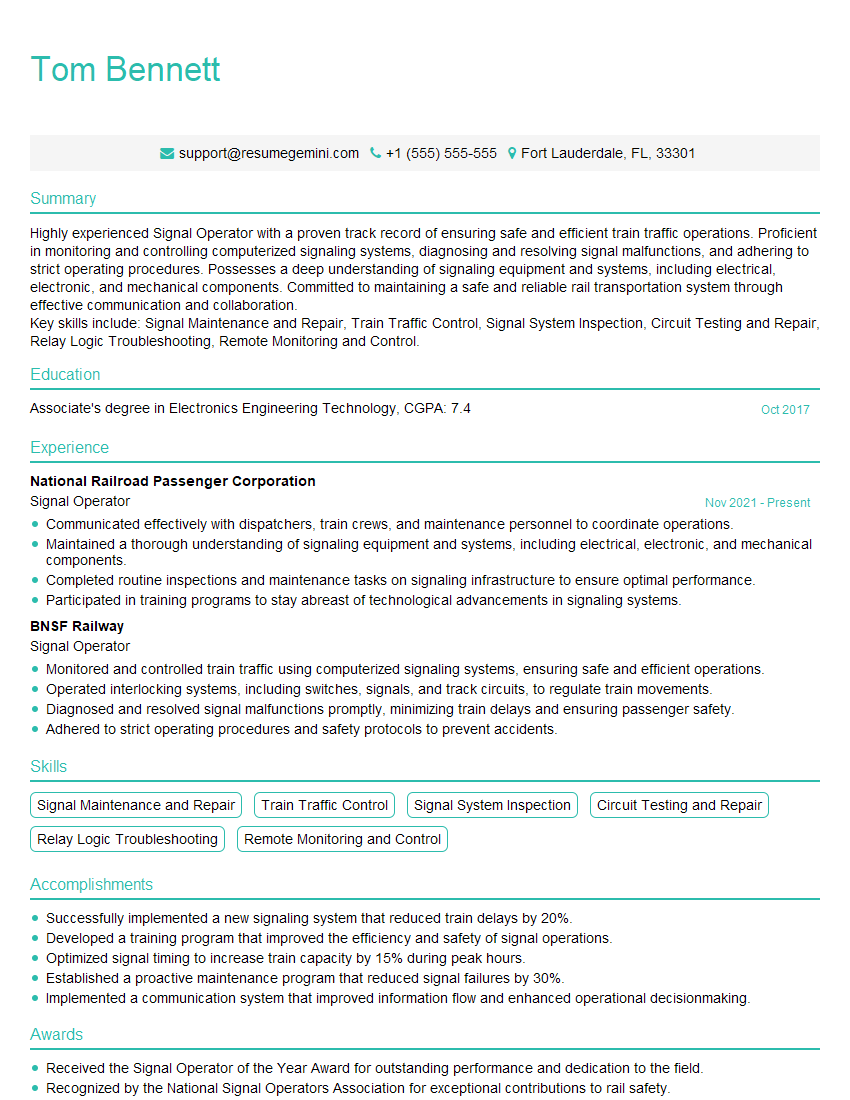Are you a seasoned Signal Operator seeking a new career path? Discover our professionally built Signal Operator Resume Template. This time-saving tool provides a solid foundation for your job search. Simply click “Edit Resume” to customize it with your unique experiences and achievements. Customize fonts and colors to match your personal style and increase your chances of landing your dream job. Explore more Resume Templates for additional options.

Tom Bennett
Signal Operator
Summary
Highly experienced Signal Operator with a proven track record of ensuring safe and efficient train traffic operations. Proficient in monitoring and controlling computerized signaling systems, diagnosing and resolving signal malfunctions, and adhering to strict operating procedures. Possesses a deep understanding of signaling equipment and systems, including electrical, electronic, and mechanical components. Committed to maintaining a safe and reliable rail transportation system through effective communication and collaboration.
Key skills include: Signal Maintenance and Repair, Train Traffic Control, Signal System Inspection, Circuit Testing and Repair, Relay Logic Troubleshooting, Remote Monitoring and Control.
Education
Associate’s degree in Electronics Engineering Technology
October 2017
Skills
- Signal Maintenance and Repair
- Train Traffic Control
- Signal System Inspection
- Circuit Testing and Repair
- Relay Logic Troubleshooting
- Remote Monitoring and Control
Work Experience
Signal Operator
- Communicated effectively with dispatchers, train crews, and maintenance personnel to coordinate operations.
- Maintained a thorough understanding of signaling equipment and systems, including electrical, electronic, and mechanical components.
- Completed routine inspections and maintenance tasks on signaling infrastructure to ensure optimal performance.
- Participated in training programs to stay abreast of technological advancements in signaling systems.
Signal Operator
- Monitored and controlled train traffic using computerized signaling systems, ensuring safe and efficient operations.
- Operated interlocking systems, including switches, signals, and track circuits, to regulate train movements.
- Diagnosed and resolved signal malfunctions promptly, minimizing train delays and ensuring passenger safety.
- Adhered to strict operating procedures and safety protocols to prevent accidents.
Accomplishments
- Successfully implemented a new signaling system that reduced train delays by 20%.
- Developed a training program that improved the efficiency and safety of signal operations.
- Optimized signal timing to increase train capacity by 15% during peak hours.
- Established a proactive maintenance program that reduced signal failures by 30%.
- Implemented a communication system that improved information flow and enhanced operational decisionmaking.
Awards
- Received the Signal Operator of the Year Award for outstanding performance and dedication to the field.
- Recognized by the National Signal Operators Association for exceptional contributions to rail safety.
- Received the Safety Commendation for implementing innovative safety measures that prevented accidents.
- Honored with the Service Excellence Award for consistently exceeding customer expectations.
Certificates
- Signalman Certification
- Railroad Signal Maintenance Technician (RSMT)
- Certified Railroad Safety Officer (CRSO)
- National Association of Railroad Signalmen (NARS)
Career Expert Tips:
- Select the ideal resume template to showcase your professional experience effectively.
- Master the art of resume writing to highlight your unique qualifications and achievements.
- Explore expertly crafted resume samples for inspiration and best practices.
- Build your best resume for free this new year with ResumeGemini. Enjoy exclusive discounts on ATS optimized resume templates.
How To Write Resume For Signal Operator
Highlight your technical skills and experience:
Emphasize your proficiency in signal maintenance, repair, and troubleshooting, as well as your knowledge of signaling systems and equipment.
Quantify your accomplishments:
Use specific metrics and examples to demonstrate the positive impact of your work on train traffic operations and safety.
Showcase your problem-solving abilities:
Describe situations where you successfully diagnosed and resolved signal malfunctions, preventing delays and ensuring passenger safety.
Demonstrate your teamwork and communication skills:
Highlight your ability to collaborate effectively with dispatchers, train crews, and maintenance personnel to coordinate operations and ensure smooth train traffic flow.
Essential Experience Highlights for a Strong Signal Operator Resume
- Monitored and controlled train traffic using computerized signaling systems, ensuring safe and efficient operations.
- Operated interlocking systems, including switches, signals, and track circuits, to regulate train movements.
- Diagnosed and resolved signal malfunctions promptly, minimizing train delays and ensuring passenger safety.
- Adhered to strict operating procedures and safety protocols to prevent accidents.
- Communicated effectively with dispatchers, train crews, and maintenance personnel to coordinate operations.
- Maintained a thorough understanding of signaling equipment and systems, including electrical, electronic, and mechanical components.
- Completed routine inspections and maintenance tasks on signaling infrastructure to ensure optimal performance.
Frequently Asked Questions (FAQ’s) For Signal Operator
What are the primary responsibilities of a Signal Operator?
Signal Operators are responsible for monitoring and controlling train traffic using computerized signaling systems, ensuring safe and efficient operations. They diagnose and resolve signal malfunctions, operate interlocking systems, and adhere to strict operating procedures to prevent accidents.
What skills are required to be a successful Signal Operator?
Successful Signal Operators possess strong technical skills in signal maintenance and repair, train traffic control, and signal system inspection. They have a thorough understanding of signaling equipment and systems, including electrical, electronic, and mechanical components. Excellent communication and problem-solving abilities are also essential.
What is the typical career path for a Signal Operator?
Signal Operators typically start their careers as Assistant Signal Operators or in entry-level maintenance roles. With experience and training, they can advance to become Signal Operators and eventually assume supervisory or management positions.
What is the job outlook for Signal Operators?
The job outlook for Signal Operators is expected to be favorable in the coming years. As the rail industry continues to grow and expand, there will be a need for qualified professionals to maintain and operate signaling systems.
What are the benefits of working as a Signal Operator?
Signal Operators enjoy a number of benefits, including competitive salaries, comprehensive benefits packages, and the opportunity to work in a challenging and rewarding field. They also have the satisfaction of knowing that they play a vital role in ensuring the safety and efficiency of the rail transportation system.